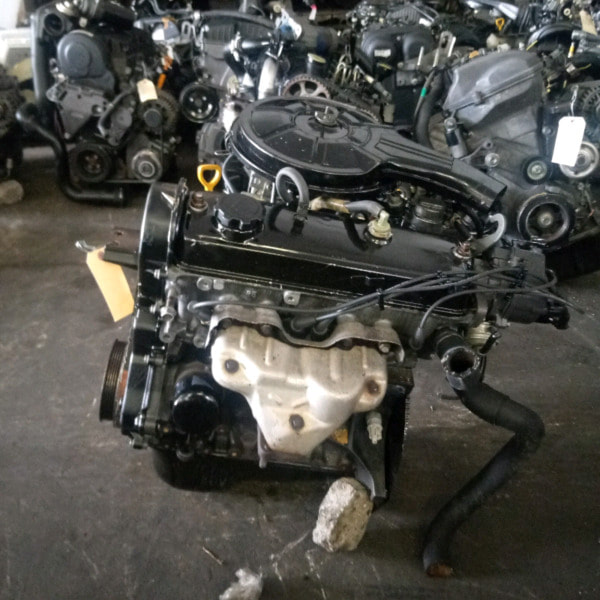Come back when traveling: Toyota Tazz Engine for Sale, Finest Offers Await
Come back when traveling: Toyota Tazz Engine for Sale, Finest Offers Await
Blog Article
Engine Purchasing Specialist Tips on Picking the Right Engine for Your Specific Requirements
Picking the appropriate engine for your particular needs involves a complicated interplay of factors that go past simple horse power figures. By diving into the ins and outs of power versus effectiveness, examining fuel ratings, and budgeting for lasting expenses, one can genuinely maximize their engine selection.
Power Vs. Performance: Discovering the Equilibrium

When choosing an engine, it is vital to strike an equilibrium between power and efficiency to fulfill your certain requirements properly. Power describes the engine's capability to produce power for propulsion, figuring out elements like acceleration, hauling capacity, and total efficiency (Toyota Tazz Engine For Sale). On the other hand, performance associates to just how well the engine uses fuel to create power, affecting factors such as gas economic climate and ecological kindness
Accomplishing the right equilibrium between power and effectiveness is vital because an engine that is also powerful might take in too much fuel, bring about higher operating prices and unnecessary stress on the environment. On the other hand, an engine that prioritizes effectiveness over power might lead to sluggish performance, specifically in demanding scenarios like pulling heavy tons or driving uphill.
To make an informed decision, take into consideration elements such as your normal driving conditions, the designated usage of the vehicle, and your individual choices. By assessing your top priorities and requirements, you can pick an engine that strikes the perfect balance in between power and performance, guaranteeing optimum efficiency while reducing environmental influence and operating prices.
Comprehending Engine Dimension and Kind

In addition, engine type plays a vital duty in establishing the efficiency features of an engine. Common engine types include inline engines, V engines, and rotary engines, each with its unique advantages and drawbacks. The engine kind influences aspects such as the engine's size, weight distribution, and power delivery. Comprehending the interplay between engine size and kind is important in picking an engine that lines up with your details demands and top priorities, whether it be power, effectiveness, or a balance of both.
Consider Your Vehicle's Needs
Considering your automobile's requirements is a basic step in the engine choice process to guarantee optimal efficiency and performance. It is vital to assess factors such as the meant use the automobile, its weight, towing capability, and gas performance requirements. For instance, if you are trying to find an engine for a heavy-duty truck that will certainly be used for towing, you will certainly need a powerful engine with high torque abilities. On the various other hand, if you are selecting an engine for a portable automobile largely used for city travelling, gas efficiency may be a more essential element to think about.

Reviewing Gas Performance Scores
Evaluating gas effectiveness scores is a crucial facet of picking the right engine for your vehicle, ensuring cost savings and ecological sustainability. Fuel efficiency rankings, normally determined in miles per gallon (MPG) for gas engines or kilowatt-hours per 100 miles (kWh/100 miles) for electrical engines, suggest how far a vehicle can travel on a certain amount of gas or electricity. Greater MPG or reduced kWh/100 miles values signify extra reliable engines, equating to reduced gas expenses and lower carbon emissions.
Furthermore, contrast different engine options within the exact same vehicle class to recognize the most economical option. Variables such as engine size, weight, the rules of aerodynamics, and hybrid or electrical capabilities can all affect fuel performance.
Budgeting for Long-Term Costs
Tactically preparing for long-lasting costs moved here is essential when selecting an engine, ensuring economic sustainability over the lorry's life expectancy. While the preliminary acquisition cost of an engine is a substantial element, it is important to take into consideration the long-lasting expenses associated with maintenance, repairs, and fuel consumption.
Furthermore, researching the accessibility and price of replacement components for the chosen engine is essential in budget plan preparation. By thoroughly budgeting for these lasting expenditures and factoring them into the decision-making process, individuals can choose an engine that not only satisfies their prompt needs however additionally remains cost-effective throughout its life expectancy.
Conclusion
In verdict, choosing the right engine for your certain demands requires stabilizing power and effectiveness, understanding engine dimension and type, considering your automobile's needs, evaluating fuel effectiveness ratings, and budgeting for long-term costs. By very carefully taking into consideration these factors, you can guarantee that you select an engine that satisfies your needs and supplies optimum efficiency for your lorry.
To further refine the selection procedure of an engine that strikes the optimum equilibrium in between power and performance, it is see page important to dig right into the intricacies of recognizing engine dimension and kind. Engine dimension refers to the overall quantity of air and fuel that can be pushed via the engine cylinders. Typical engine types include inline engines, V engines, and rotary engines, each with its one-of-a-kind benefits and disadvantages. Comprehending the interplay between engine size and kind is essential in selecting an engine that lines up with your specific demands and top priorities, whether it be power, performance, or an equilibrium of both.
Fuel performance ratings, usually gauged in miles per gallon (MPG) for fuel engines or kilowatt-hours per 100 miles (kWh/100 miles) for electrical engines, suggest how far an automobile can take a trip on a certain quantity of gas or power.
Report this page